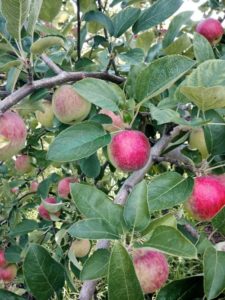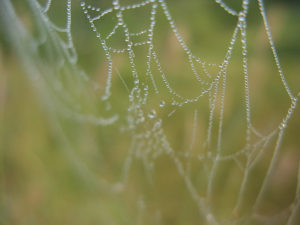Plant Your Apple Tree
“Even if I knew tomorrow the world would go to pieces, I would still plant my apple tree.”
– Martin Luther
 A few weeks ago, I had the wonderful opportunity of teaching and participating in a weekend retreat/workshop at the Treetop Zen Center in Maine – “Preserving Indra’s Net: An Eco-Spiritual Gathering.” The gathering was relatively small and local, but the concerns people expressed about the ongoing devastation of our Earth and its climate and our role in this trend were the same concerns I’ve heard from people all over the world whether in cities, forests or farms, in countries of the North or the South. I listened to people express their despair and confusion in the face of what seems like an unstoppable, ever-quickening trajectory of harm. Loss of species and habitats, continued spewing of harmful gases into the atmosphere, oceans depleted and warming – in the face of this, despair and confusion can seem like the only appropriate response. In fact, there is another way to respond — a way out of despair and confusion. It’s possible to learn from past struggles, wise teachers and our own experience of our true nature to not only ‘not despair,’ but to act; and to do so wisely and fiercely from a place of love and compassion for the earth and for ourselves.
A few weeks ago, I had the wonderful opportunity of teaching and participating in a weekend retreat/workshop at the Treetop Zen Center in Maine – “Preserving Indra’s Net: An Eco-Spiritual Gathering.” The gathering was relatively small and local, but the concerns people expressed about the ongoing devastation of our Earth and its climate and our role in this trend were the same concerns I’ve heard from people all over the world whether in cities, forests or farms, in countries of the North or the South. I listened to people express their despair and confusion in the face of what seems like an unstoppable, ever-quickening trajectory of harm. Loss of species and habitats, continued spewing of harmful gases into the atmosphere, oceans depleted and warming – in the face of this, despair and confusion can seem like the only appropriate response. In fact, there is another way to respond — a way out of despair and confusion. It’s possible to learn from past struggles, wise teachers and our own experience of our true nature to not only ‘not despair,’ but to act; and to do so wisely and fiercely from a place of love and compassion for the earth and for ourselves.
Let’s face it, we humans have been in trouble before. We’ve faced (and continue to face) great challenges, particularly in the fight for freedom and equality. Gandhi and the Satyagrahis, Martin Luther King and the civil rights workers, these are individuals who worked for change in the face of what seemed at the time to be impossible odds. Amazing strength and wisdom can be drawn from these movements for help with the current struggle we find ourselves in. For me, the most powerful of these lessons has been the willingness to let go of outcome, while at the same time taking action in the face of profound uncertainty. When I first heard this idea, however, I couldn’t understand how I could possibly let go of the desire for a particular outcome when I cared so much about the earth and all the beings that depend upon it for life. Gandhi, in his struggle for independence from the British Raj, which had held India in a yoke of oppression for over 100 years, said the following:
“It is the action, not the fruit of the action, that’s important. You have to do the right thing. It may not be in your power, may not be in your time, that there’ll be any fruit. But that doesn’t mean you stop doing the right thing. You may never know what results come from your action. But if you do nothing, there will be no result.”
We may never see the results of our actions on climate change, for example, but acting in spite of not knowing, staying the course for what is true, gives real power to our actions and enables us to move forward even in the face of great difficulty. And, you never know, you may just have the joy of seeing change in your lifetime, as Gandhi, Martin Luther King, Nelson Mandela and others have seen. In the past twenty-five years, we’ve even seen the reversal of the destruction of the ozone layer, which many said was too big a problem to solve. Letting go of outcome, we preserve our strength; by continuing to act, we don’t yield to despair.
While despair is a powerful force, truth and love are more so. Last year I had the great joy of being at a gathering listening to the wonderful Buddhist teacher Thich Nhat Hahn tell a story about the work of their community of engaged Buddhist nuns and monks during the Vietnam War. A group of monks and nuns were living and working in a small village that was bombed and destroyed by American forces. Not knowing how to respond in the face of this destruction, a delegation traveled to Thich Nhat Hahn to ask him what to do. “Should we rebuild?” they asked. “You must rebuild,” he answered. “There is no other choice.” They rebuilt. The village was bombed again. Again they rebuilt. The village was bombed a third time. Again they went to their teacher. Again he told them, “You must rebuild.” The village survived.
Thich Nhat Hahn looked out at those of us in the audience before him and said with absolute certainty, “You must never despair.” Hearing this elderly teacher who had seen and personally experienced so much suffering say these words was life changing. I saw in that moment that my Buddhist training of being present with what is, the moment itself, could free me from the despair that was always lurking as I tried to act to relieve suffering in the world. I took away from it the ability to ask the question, “What is the right thing to do in this moment?” freed from wondering about the past or future, which after all do not exist.
Finally, as we live and act in the world, in the face of all its pain and all its beauty, we can remember our own true nature. Sri Nisargadatta, the simple and eloquent Indian sage, reminds us of our true nature in the following quote:
“Wisdom tells me I’m nothing.
Love tells me I’m everything.
Between the two my life flows.”
When we remembe r that we are connected, even to those with different beliefs, and part of all things, we tap into the love, wisdom and compassion that are our true nature. When we tap into our true nature, we know and act from the place of deepest truth. And when we act from truth, we act with a fierce and compassionate strength.
r that we are connected, even to those with different beliefs, and part of all things, we tap into the love, wisdom and compassion that are our true nature. When we tap into our true nature, we know and act from the place of deepest truth. And when we act from truth, we act with a fierce and compassionate strength.
Gandhi called the independence movement in India, Satyagraha, a word derived from Sanksrit and translated variously as “insistence on truth,” “soul force” or “truth force.”
When explaining the word he said,
“Truth (satya) implies love, and firmness (agraha) engenders and therefore serves as a synonym for force. I thus began to call the Indian movement Satyagraha, that is to say, the Force which is born of Truth and Love…”
So, to you who are reading this, I’m making a call to engage in the struggle, to become Satyagrahis for the Planet and for all beings on it. A call to act from a force born of truth and love, to never despair and to plant our apple trees no matter what may come.
